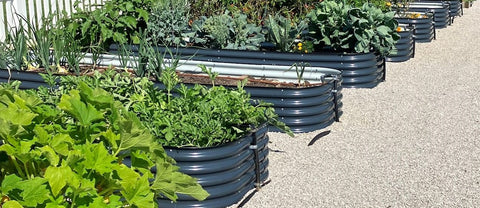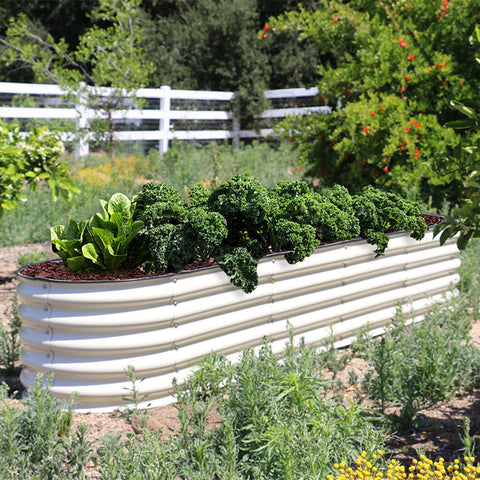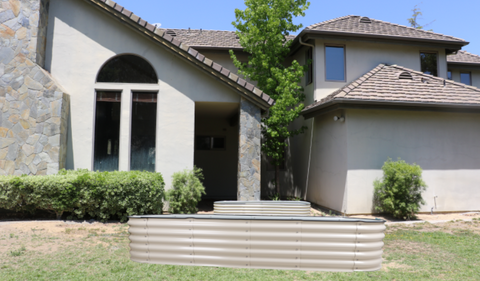Tips from Olle Garden Bed: Should I Put Coffee Grounds In My Garden
Should I put coffee grounds in my garden? I heard conflicting proposals. Coffee grounds should only be used in the garden when planting acid loving plants. Even so, they should also be used with care. If you carefully limit the amount of coffee you use, you can also mix it into compost. However, these are the only two ways you should use coffee in your garden. The following content also has some reference value for raised garden beds.

Resist the impulse to put coffee grounds into containers or mix them with plant soil - except for acid loving plants such as blueberries, azaleas or azaleas. Even so, please follow our instructions carefully.
We know this runs counter to the advice millions of gardeners have heard about adding coffee grounds directly to the soil, mixing coffee grounds into the soil mixture, or using coffee as a side dish. It turns out that coffee is bad for most plants for several reasons.
Proponents of adding coffee to garden soil often say it contains nitrogen for plants. Indeed, a little nitrogen is good for plants. However, if you use coffee to improve the soil, it is easy to give your plants too much nitrogen. Although reaching a certain amount of nitrogen will increase the size of plants, excessive nitrogen will actually inhibit the production of flowers and fruits.
The high nitrogen content of coffee is not always beneficial. The acidity of coffee and its nitrogen make it possible for mold to bloom anywhere in the garden where coffee is used. This mold bloom is accompanied by a threat to plant health and soil health. That's why if you want to use coffee in your garden, we recommend that you follow our instructions to add coffee to the compost. Read on - you'll find these instructions at the end of this article.
Another theory is that caffeine in coffee can help plants grow or promote flowering. Intuitively, this makes sense. If some coffee can give us energy and improve our productivity, why are flowers and plants different?
It was this idea that led some gardeners to pour liquid coffee on plants or add used coffee grounds to the soil. Caffeine is a human performance enhancer, so why shouldn't it also enhance the performance of plants?
Unfortunately, when scientists studied the plants that produce caffeine themselves, they found that the performance of nearby competing plants was actually inhibited. Although this study focuses on the plants that produce caffeine, rather than the plants that are treated with caffeine, we can safely assume that the results in both cases are similar.

The used coffee grounds do contain enough caffeine to function. After squeezing as much liquid as possible from the used coffee grounds, the caffeine is equivalent to the caffeine in a cup of tea.
You may have heard that coffee grounds are antibacterial and that they are good for the soil. After all, humans use antibacterial products to help us fight disease and stay healthy. Some people think that adding coffee can help plants keep healthy because it is antibacterial. The fact is that bacteria work hard in the soil to break down organic matter into components that can be processed by plants.
The use of any antibacterial agent, including coffee, will kill these beneficial bacteria and any bacteria that pose a threat to plant health. One study showed that earthworms were also killed when coffee grounds were used for composting. Coffee causes serious damage to the natural decomposition process occurring in the soil, because it will kill microorganisms, which will decompose materials into plant nutrients.
For this reason, we do not recommend adding coffee directly to the soil, either in the soil where plants grow or as a side dish. When coffee is used for composting, we start from scratch, rather than adding coffee directly to the compost heap. The amount of coffee we recommend is also limited, because too much coffee may be harmful to plant health and soil health.
How to use coffee in compost for acidophilic plants
The only plants we recommend to use coffee in the garden are acid lovers such as blueberries, azaleas and azaleas. Even with these plants, it is important to follow a recipe that limits the amount of garden coffee used. The pH value of coffee grounds is even higher than the tolerance level of acid loving plants, so it is very important to minimize their use.
You will notice that we only provide instructions for adding coffee to the compost and then handing the compost to your plant. We do not recommend using coffee directly on your soil, either in liquid or ground form. We also do not recommend side trimming or covering with coffee grounds. Make a compost mixture from coffee and use the mixture to improve the soil, ensuring that coffee is beneficial and that plants do not get too much nitrogen or acid.
For every 10 pounds of coffee grounds added to the existing compost, add one cup of agricultural lime or hardwood ash. Of course, if you use less coffee, you need to adjust the amount of lime or ash to match.
If you don't have compost, there is a simple way to make coffee compost that you can use in your garden. Simply mix the chopped leaves with 10 to 25 percent coffee or ash. Then add agricultural lime or hardwood ash at a ration of 10 pounds of coffee grounds per cup.
This mixture can be used for acid loving plants, just like any finished compost. Lay it on the soil surface as a cover, mix it as a side dressing, or use it as a soil conditioner. But please keep the use of acid lovers in the garden.
Coffee is too much for most plants. Unless you follow our recipes, it's easy to use too much coffee. Only plants that like acid can really benefit from coffee. It contains too much acid for other plants.

The use of coffee is accompanied by the risk of mold flooding, which can kill beneficial microorganisms and earthworms in the soil. For plants that do not like acid, these risks are not offset by any benefits. Because of these risks, you can also decide not to use coffee on acid loving plants.
There are many other ways to increase the soil acidity of these plants, and these methods will not be accompanied by the risk of mold blooming and killing beneficial bacteria and earthworms. Caffeine or too much nitrogen may also inhibit the leaves, fruits and flowers of plants.
We simply do not recommend that coffee be used casually on top of the soil, as a liquid, or as a cover or side dressing, unless it is mixed into the composting formula, as we give it. We also do not recommend using coffee unless it is on an acid loving plant. Ultimately, whether or not to use coffee in the garden is up to you. After reading this article, you will understand the risks and benefits of using coffee in your garden so that you can make wise and informed decisions.
